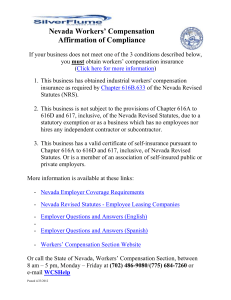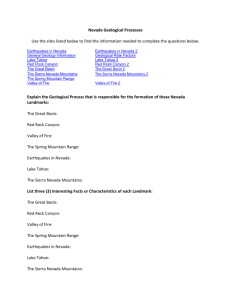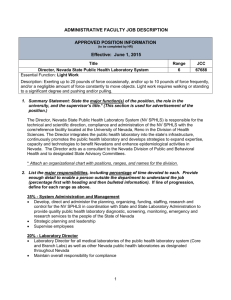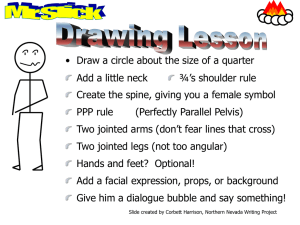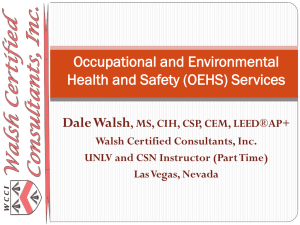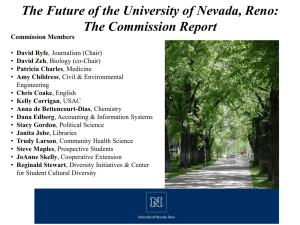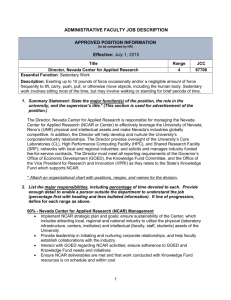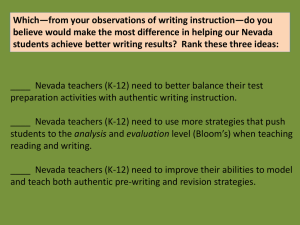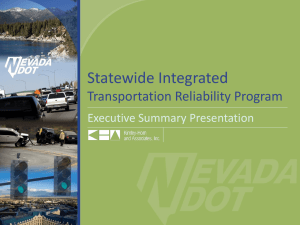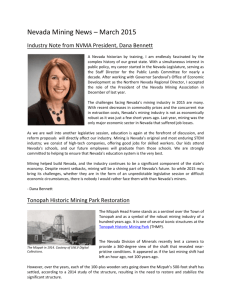Community Themes and Strengths Assessment
advertisement
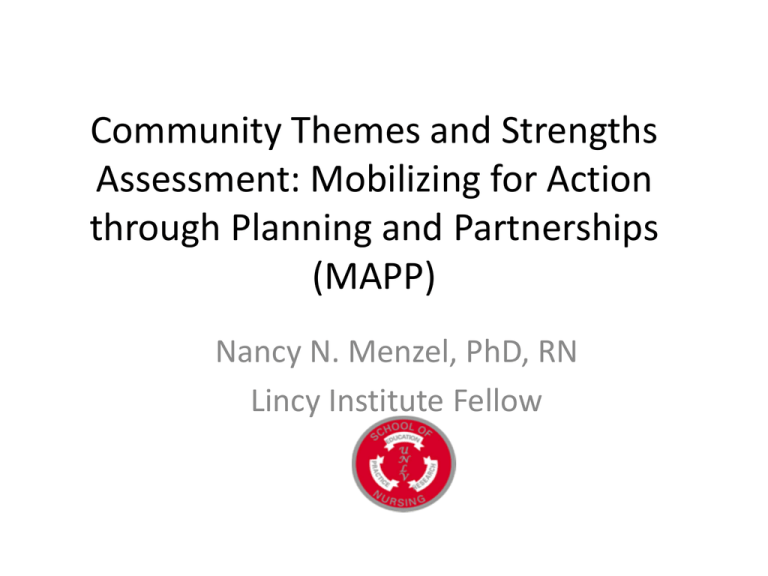
Community Themes and Strengths Assessment: Mobilizing for Action through Planning and Partnerships (MAPP) Nancy N. Menzel, PhD, RN Lincy Institute Fellow What’s the Difference… • Between Nevada and Mississippi? Mississippi Spends Almost 3 x More on Public Health! • State Public Health Budget Per Capita Ranking – #51 Nevada: $3.41 per person – # 48 Mississippi: $9.70 – National Median: $30.61 – Per capita ranking #1 Hawaii: $171.30 • http://healthyamericans.org/assets/files/Investing%20i n%20America%27s%20Health.pdf • Nevada ranks at the bottom of most health indeces. Urban Sustainability: Health • Without a healthy population, Las Vegas is not sustainable. – Need healthy workers. – Need healthy children and elderly to avoid draining public money for Medicaid and other social safety net funds – Health is a resource for daily life, not an outcome of treatment of illness. Opportunity Index Nevada ranked #51. It had the lowest score of any state for “Community.” - http://opportunityindex.org/#4.00/36.516/-90.232//Nevada Community Health and Civic Life Dimension Community Health and Civic Life Dimension CIVIC ENGAGEMENT Group Membership (% of adults 18 and over involved in social, civic, sports, and religious groups VOLUNTEERISM Volunteerism (% of adults ages 18 and older) YOUTH ECONOMIC AND ACADEMIC INCLUSION Teenagers Not in School and Not Working (% ages 16-19) SAFETY Violent Crime (per 100,000 population) or Homicide (per 100,000) for counties where violent crime rates were not available ACCESS TO HEALTH CARE Primary Care Providers (per 100,000 population) ACCESS TO HEALTHY FOOD Grocery Stores and Supermarkets (% of zip codes with at least one ) The Project Partnership with the Southern Nevada Health District (SNHD) to: 1. conduct one of the assessments in the MAPP process, a strategic planning framework. 2. Structure the remaining 3 assessments 3. Seek external funding to address identified community needs. National Association of County and City Health Officials (NACCHO) MAPP Community Themes and Strengths Assessment (CTSA) Provides a deep understanding of the issues that residents feel are important by answering the questions: • “What is important to our community?” • “How is quality of life perceived in our community?” • “What assets do we have that can be used to improve community health?” Methods • Convene representatives from a broad base of community residents to achieve consensus on the issues important to Southern Nevada. • Town hall style meetings using Technology of Participation (ToP) facilitator • Focus groups “Town Hall” Invitees “What’s Right with Our Community?” • About 350 people/agencies invited • SNHD secretarial staff assisted Large Group Meetings • April 12 (p.m.) and April 13 (a.m.) at the Student Union • Total of 62 participants • Broad representation of community sectors • Use of construction paper and sticky wall • School of Nursing hired a PhD nursing student to assist in data collection and analysis Participants • • • • • • • • • • • • Hispanic/AA organizations Religious org. Private citizens Public lands found. Child health Hospitals Health care providers Mental health CCSD PTA UNLV/NSC/CSN YMCA • • • • • • • • • • • Hospital nurses Social services agencies Metro police Emergency services Transportation US senator/representative staff Municipal gov’t. State agencies SNHD Businesses Unions Not Represented • • • • • • Native Americans Asian Americans Land developers Water supply/treatment Physicians Media • Local/state elected officials • Zoning boards • Technical schools • Private higher ed. Focus Groups/Interviews • Pursued sectors not represented; limited success in recruitment • Added school nurses, social workers, and print/online media Themes: All participants • Community engagement • Built environment • Diversified economy • Education (access, commitment, quality) • Healthcare (access, quality, continuity) • Public safety How are we doing? Good, okay, poor Themes: 1 Large Group + 1 Focus Group • • • • Cultural opportunities Family support Good government Recreation (second group included this under Built Environment) • Social services How are we doing? Good, okay, poor Themes: Focus Groups Only • Mental health services • Provision of public services at an adequate level • Synergy between education and economy • Healthy public policies • Partnership/communication among organizations • Leadership (as distinct from government) • Beauty in natural environment How are we doing? Good, okay, poor Healthy Community Elements Cultural opportunities Recreation Family support Social services Good government Public safety Healthcare Education Diversified economy Built environment Community engagement 0 1 2 3 Frequency 4 5 6 Community Assets • Process: whiteboards and map • Recurrent themes (written): – good weather, demographic diversity, wealthy individuals/celebrities, access to politicians, name recognition for Las Vegas, RTC, casinos, faith community, Three Square, Opportunity Village, Southern Nevada Health District, Hoover Dam, and Nellis AFB • Longest list: Voluntary Sector Assets Quality of Life Survey Question Mean 1. Are you satisfied with the quality of life in our community? 2.80 1. Are you satisfied with the health care system in the community? 2.14 1. Is this community a good place to raise children? 2.12 1. Is this community a good place to grow old? 2.59 1. Is there economic opportunity in the community? 2.26 1. Is the community a safe place to live? 3.04 1. Are their networks of support for individuals and families? 2.83 1. Do all individuals and groups have the opportunity to contribute to and participate in the community’s quality of life? 2.72 1. Do all residents perceive that they – individually and collectively – can make the community a better place to live? 2.34 1. Are community assets broad-based and multi-sectoral? 2.28 1. Are levels of mutual trust and respect increasing among community partners as they participate in collaborative activities to achieve shared community goals? 2.98 1. Is there an active sense of civic responsibility and engagement and of civic pride in shared accomplishments? 2.39 Limitations • Small sample size • Mostly qualitative data • Some community segments not represented Conclusions • • • • • • Visioning process Educational process Built partnerships and interest Quality of life needs improvement There are an array of assets available Must build community engagement to effect change A Vision for an Engaged, Educated, and Healthy Community • A healthy community is one whose residents are knowledgeable and involved in improving quality of life through informed leadership and healthy public policy. Residents in a healthy community have access to resources and services they need, such as high quality health care, an effective public education system, and a safe and supportive environment. Southern Nevada Community Values • Community engagement · A community in which all segments of the population are involved, as illustrated by volunteerism, engagement in education, public/private partnerships, increased social capital, and participation in public dialogue. · A community supported by visionary leadership, both public and private. Southern Nevada Community Values • Education · A community that values education as illustrated by allocation of needed resources, high school graduation rates that equal or exceed national norms, and lifelong learning opportunities. · A community where an educated workforce attracts diversified businesses and contributes to a strong, sustainable economy. Southern Nevada Community Values • Health · A community where high quality mental and physical health care is accessible to all residents, including the indigent and underserved. · A community that recognizes the interaction of policies, systems, and the environment on health and supports public policies that promote health and prevent disease. Southern Nevada Community Values • Environment · A community where residents feel safe, have access to life-sustaining resources such as clean air and water, and reside in nurturing surroundings that meets their needs for self-respect, interaction with others, recreation, and connection with nature. · A community that values and respects the contributions of many cultures to quality of life. · A community that supports changes to the built environment that promote healthy, active lifestyles. Progress • SNHD is proceeding with MAPP, using data from CTSA – Local Public Health System Assessment – Community Health Status Assessment – Forces of Change Assessment • SNHD will seek accreditation in 2013, using the above data to write a Community Health Assessment and a Community Health Improvement Plan External Funding • SNHD received a $61,995 grant from NACCHO to complete the remaining MAPP assessments and proceed to accreditation application – Sub-award to UNLV to complete two of the assessments • Accreditation will make SNHD competitive for federal grants from the Centers for Disease Control and Prevention and other sources, such as Robert Wood Johnson Foundation.
